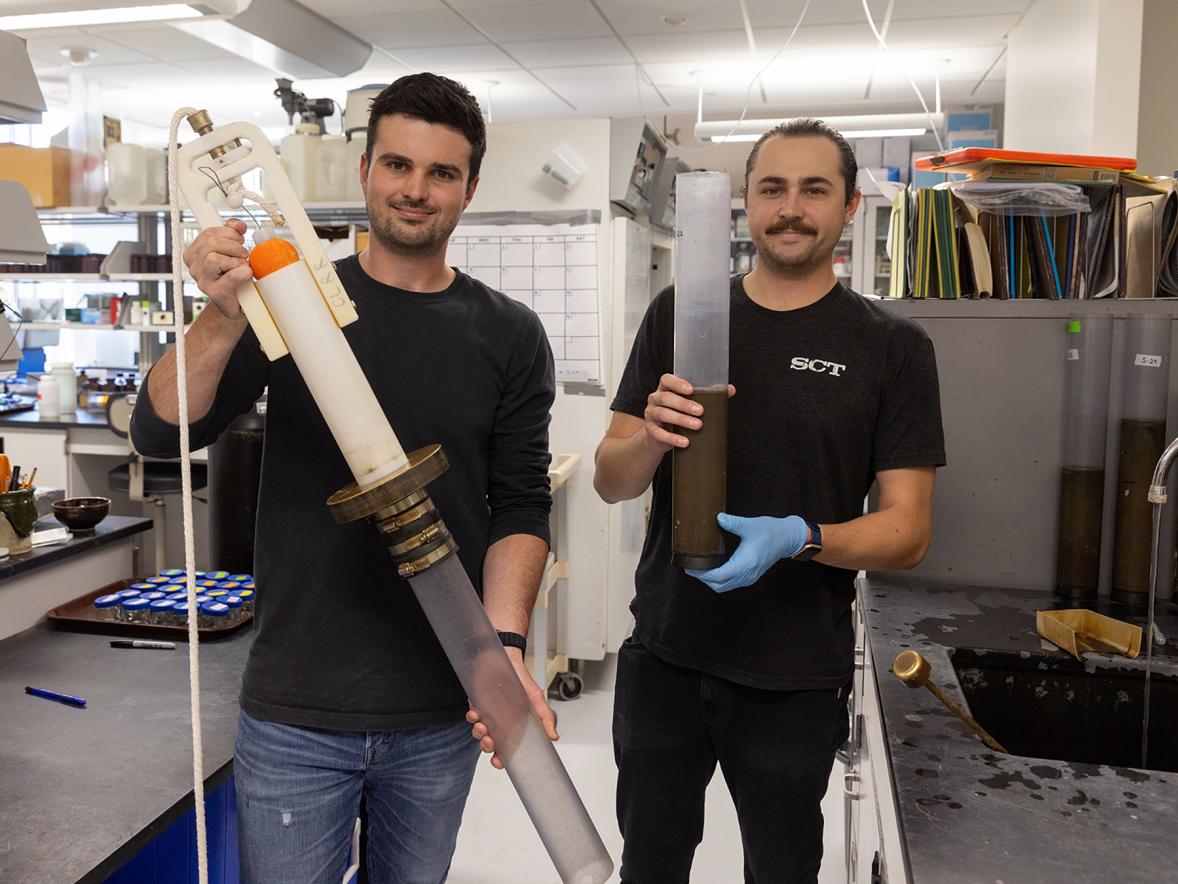Pursue Your Passion for the Natural World
UW-Stout's Bachelor of Science B.S. in Environmental Science degree program prepares you for careers in conservation, environmental health, and sustainable management of our natural resources. Our polytechnic approach focuses on helping you develop practical skills through applied field and lab experiences that address real-world environmental problems. You'll get personalized support in our close-knit program—from research with faculty to support in the classroom—to ensure you succeed, whether you pursue graduate work or go directly into your career.
100% of Graduates Are Employed or Continuing Education.
Distinguish Your Degree with a Concentration
Pursue a concentration to develop the specialized skills necessary in your desired career path.
Aquatic Biology: Careers in aquatic and wetland ecosystem management and restoration, fishery science, limnological research, and water quality testing.
Environmental Health: Careers in public health and epidemiology, pollution monitoring, environmental remediation, food safety and security, and toxicology research on new chemicals.
Human Dimensions: Careers working with stakeholders and community members in environmental management, conservation planning, non-profit leadership, environmental justice, environmental policy, conservation advocacy, and outreach and education.
Natural Resource Conservation: Careers in ecological restoration, land management, wildlife and wildlands conservation, ecological monitoring, wetland delineation, and soil conservation.
Earn an Optional Minor
You can also easily earn minors that develop additional in-demand expertise.
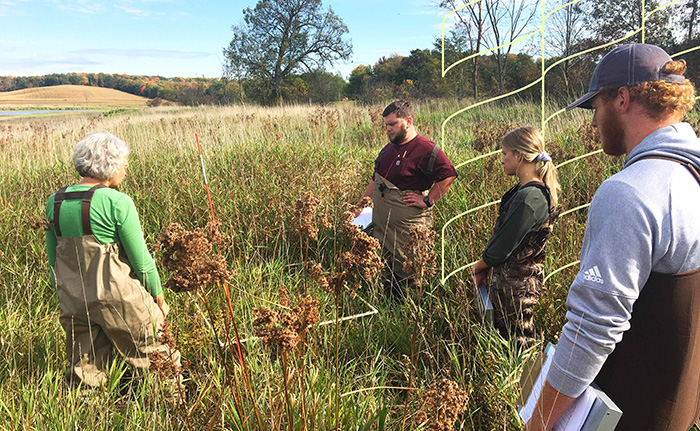
Make an Impact Through Applied Research & Field Work
Environmental Science students engage directly in research with faculty and staff during capstone projects or as undergraduate researchers. In the past five years, our students have worked on a wide array of faculty and industry-supported projects.
“Working in the field helps me learn faster and understand concepts. I know a lot of students at other universities and colleges don't get opportunities for hands-on learning like this, and it is good experience for future internships and jobs."
-Keaton Kuzel
- Paid opportunities in local stream and lake water quality monitoring
- NSF-funded LAKES research involving social-environmental science research collaborations on our own Lake Menomin and the Red Cedar Watershed
- Winter limnology of Lake Menomin
- Monitoring wetland restoration project success on local WRP wetlands
- Studying harmful algal blooms in Lake Menomin and other local lakes with faculty and our Center for Limnological Research and Rehabilitation
- GIS modelling of phosphorus pollution
- Dobb’s landing collaboration for prairie management with The Prairie Enthusiasts
- Development of management plans and invasive species monitoring at the local Colfax-Red Cedar Preserve and Recreation Area
- Surveying rare plant species and mosses at the local Devil’s Punchbowl Preserve (collaboration with Landmark Conservancy)
- Monitoring the effects of fire on prairies at the local Dunnville Bottoms State Recreation Area
- Small mammal trapping in restored prairie ecosystems
- Restoration planning and invasive plant species management in our campus Outdoor Classroom
- Radiation surveys of Menomonie
- Assessment of pesticides in the well waters of local subdivisions
- Human health effects of harmful algal blooms in Lake Menomin
You can also apply for student research grants through the Office of Research and Sponsored Programs and take advantage of opportunities to travel to national research conferences (paid by UW-Stout). Our students have presented regionally and nationally at The Prairie Enthusiasts, Wisconsin Wetlands Association, National Council of Undergraduate Research, National Environmental Health Association, Ecological Society of America, and other conferences.
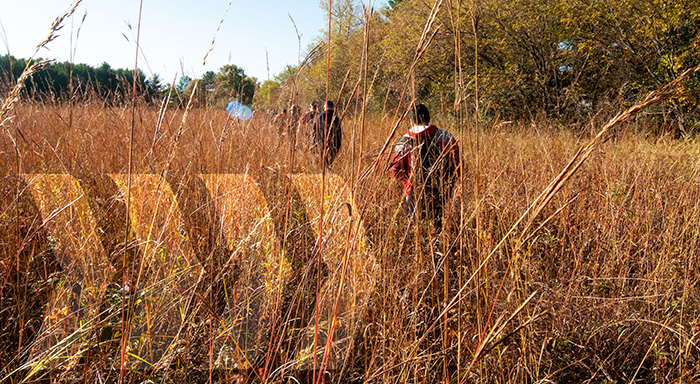
Refine Your Knowledge with In-Depth Coursework
Your first year will include introductory courses in biology, chemistry, mathematics and other core disciplines, along with a one-credit Environmental Science Profession course to better identify possible career tracks. As you advance, you'll build in-depth knowledge with specialized courses in specific subject areas.
- Organismal Biology. Plant Biology, Zoology, Ichthyology, Wildlife Techniques, Natural History of the Neotropics (Belize), Vascular Plant Taxonomy, Applied Plant Science and Management, and Entomology.
- Ecological Systems. Ecology, Soil Science and Conservation, Restoration Ecology, and Intermediate and Advanced Geographic Information Systems.
- Environmental Health & Chemistry. Epidemiology, Environmental Toxicology, Analytical Chemistry, and Environmental Chemistry.
- Advanced Aquatic Studies. Aquatic Ecology and Management, Wetland Ecology and Delineation, and Applied Watershed Hydrology.
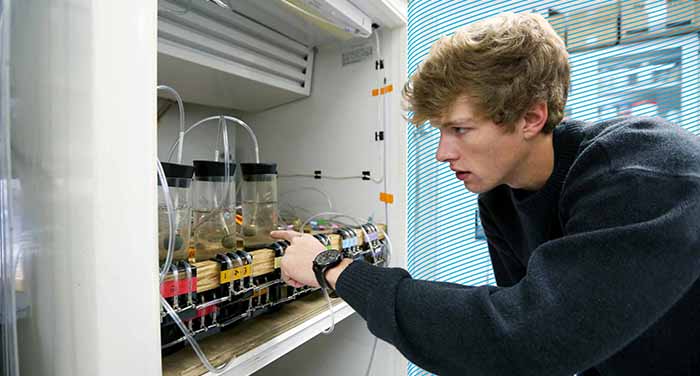
Environmental scientists are in demand! The U.S. Bureau of Labor Statistics reported 5% annual job market growth rate and predicts a 19% increase in demand for environmental scientists over the next 10 years, so you'll graduate ready to fulfill the demand in a wide range of areas and industries.
- Federal, state, and local government
- Non-profit organizations
- Environmental consulting
- Water quality testing
- Agricultural industry
- Renewable energy
- Geographic Information Systems
- Sustainability
- Natural resource management
Use the Request Information form to receive a program summary and learn more about the Bachelor of Science degree in Environmental Science.
Request Information
Take Your Education Further with a Graduate Degree
While many B.S. Environmental Science graduates pursue careers immediately after graduation, others pursue advanced degrees in a wide variety of biology, chemistry, and natural resource management fields many of which are offered at UW-Stout.
- Professional Science Masters (PSM) in Conservation Biology
- M.S. Sustainable Management
- M.S. Risk Control & Safety Management
Take Your Education Farther with International Study
We encourage you to enhance your undergraduate experience through faculty-led WinTerm and summer travel courses, university semester abroad experiences, and national student exchange opportunities.
- BIO 270 Natural History of the Neotropics provides a chance to study in Belize
- BIO 111 Science, the Environment, and Sustainability offers a chance to study in Hawai'i
- Semester programs are available in Fiji and Australia
Gain Real-World Experience Before Graduation with an Internship
Hands-on, experiential learning is a critical component of the B.S. Environmental Science curriculum. You will complete both an internship and a capstone for academic credit. These resume-building experiences are critical to developing practical job skills and qualities (effective interpersonal communication, problem-solving, and good judgment) that employers demand.
Recent student internships include:
- Conservation Intern, Wisconsin DNR
- Aquatic Plant Intern, Minnesota DNR
- Biological Science Technician, National Park Service, Great Lakes Inventory and Monitoring Network
- Student Manager, UW-Sprout Campus Garden
- Conservation Intern, Montana Conservation Corps, Eagle Mount
- Fisheries Biological Aide, Idaho Fish and Game
- Forestry Intern, Adaptive Restoration LLC
- Water Resources Intern, City of Eagan, MN
- Environmental Health and Safety Intern, Integer, Minneapolis
- Environmental Health Intern, Pierce County Public Health Department
- Natural Resources Intern, Dunn County Land Conservation
- Restoration Crew, Applied Ecological Services
- Field Crew Member, Conservation Corps Minnesota & Iowa
- Limnological Research Technician, Center for Limnological Research and Rehabilitation, UW-Stout
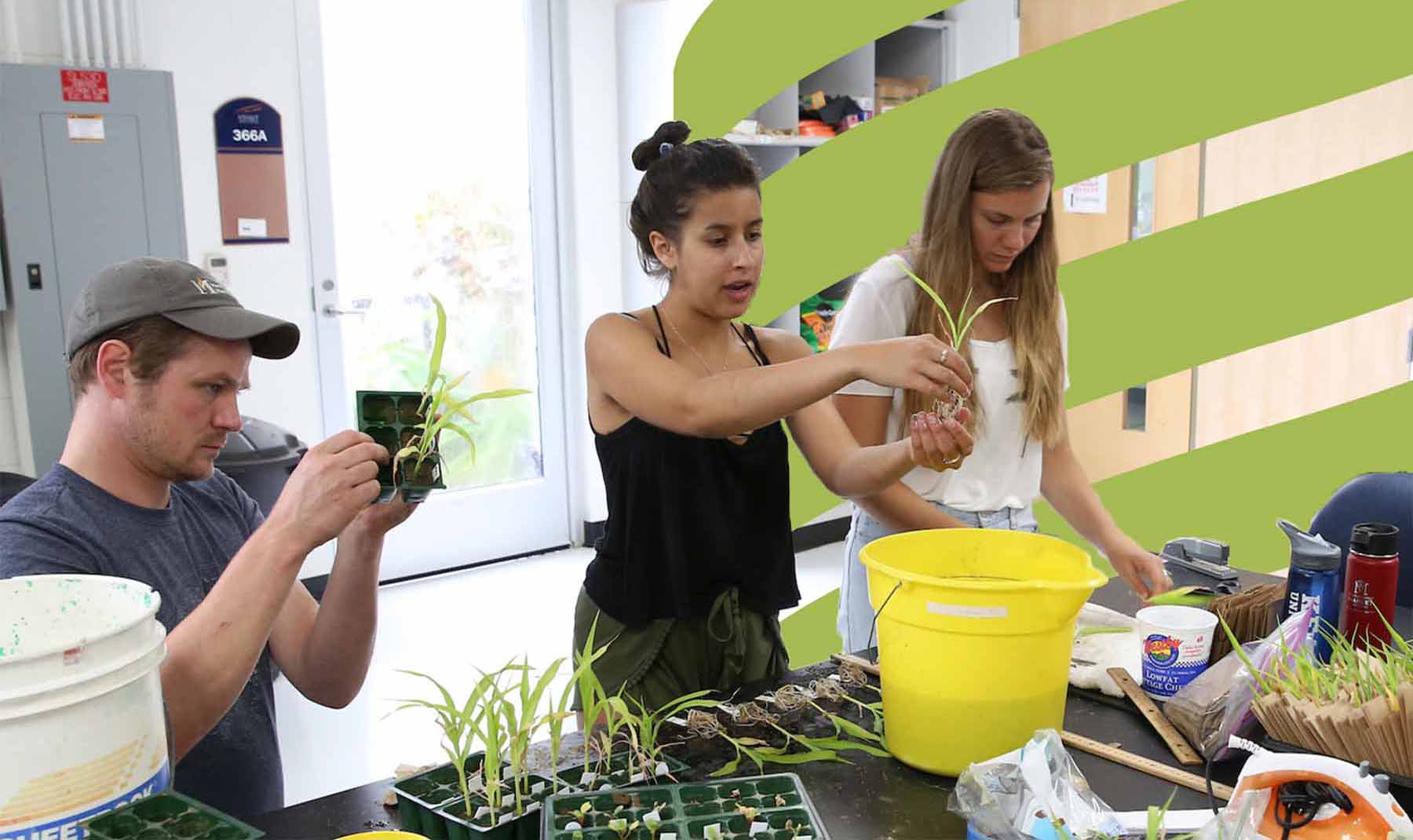
Take Advantage of Our Campus Facilities
UW-Stout has several on-campus facilities that support classroom activities and student research. Opportunities for ENSC students include:
- Greenhouse: Gain horticultural skills, study bioremediation, and grow native plants for local restoration projects.
- Campus Garden: Learn about sustainable agriculture, market gardening, pest management and volunteer management.
- Center for Limnological Research & Rehabilitation (CLRR): Collect and analyze water samples to study lake pollution and remediation.
- Analytical Chemistry Laboratories: Study water, air, and sediment pollution
- Outdoor Classroom Campus Natural Area: practice restoration techniques and learn about invasive species.
- Natural History Collections: preserve, catalog, and study plant and animal specimens.
In addition to these on-campus locations, many upper-level Environmental Science courses include field trips to local sites so that students can see real-world examples of topics covered in class.
"Stout's broad spectrum of classes/minors allows you to tailor your diploma to what you like to do. Adding GIS, Plant Science, Chemistry, or other minors to your degree can open up pathways that you weren't even aware existed."
-Tim Jackson
"I originally went to Stout unsure of what I wanted to do. Then I changed majors and entered the environmental science program. From there on out I felt like I had found where I was supposed to be. I enjoyed the professors, the students in the program, and the material taught. It’s been a great four years."
-Peter Kleinschmidt
"The program prepared me to accomplish the tasks that employers is all different fields of science are looking for—from the lab to the field. I never felt unprepared."
-Tyler Christensen
“My education at Stout prepared me for a career in the natural resources field. Student research projects provided me with the skills necessary to secure an internship and subsequent jobs. My professors provided me with a sense of belonging and a better understanding of the realities I would face during my career.”
-Chandra Wiley
"[The Environmental Science] program helped me realize what I wanted from my degree and career. I came in knowing that I wanted to be an active member within the environmental community, yet I had no real direction or focus and this program has helped remedy that. This program has positively affected not only my communication skills, but also given me the opportunity to break into the academic discourse surrounding the environmental community so that I feel more at home and centered then if I was an outsider looking in. Overall, this program has helped me become more communicative, social, hardworking and understanding, while also giving me the necessary tools to succeed in the environmental field."
-Jeremy Eckert
"The Environmental Science program helped me be successful because it allowed me to grow as a scientist and researcher. This program allowed me to experience different opportunities that led me to what career I would want to be working in the future."
-Kat Cardinal
The Environmental Science partners with a number of nonprofit, public, and private organizations to provide additional networking, learning, and volunteering opportunities, including:
- Colfax Red Cedar Preserve and Recreation Area
- The Prairie Enthusiasts Chippewa Savannas Chapter
- Dunn County Health Department
- Dunn County Conservation Department
- USDA Natural Resource Conservation Service
- Wisconsin Department of Natural Resources
- Landmark Conservancy
- Red Cedar River Water Quality Partnership
- City of Menomonie
- Trout Unlimited Clearwaters Chapter
As an environmental science student, there are several campus student organizations devoted to connecting you with other students who share your interests.
- Natural Areas Club
- Student Chapter of American Fisheries Society
- Student Chapter of the National Environmental Health Association
- GreenSense
- Ducks Unlimited
- Alfresco Student Outings Club
Advisory Committee Members
| Elizabeth | Bartho | Student | UW-Stout |
| Mike | Bessert | Professor | UW-Stout |
| Julie | Beston | Assistant Professor | UW-Stout |
| Michelle | Carlisle | Wildlife Biologist, Menomonie Field Station | Wisconsin Department of Natural Resources |
| Julia | Chapman | Lecturer | UW-Stout |
| Chase | Cummings | County Conservationist | Dunn County Land & Water Conservation |
| Connor | Dougherty | Lab Manager, Center for Limnological Research & Rehabilitation | UW-Stout |
| Lyndsey | Flaten | Water Monitoring Technician | Ramsey-Washington Metro Watershed District |
| Daniel | Freedman | Dean, CSTEMM | UW-Stout |
| Kathryn | Gallagher | Director | Dunn County Health Department |
| Holly | Geurts | Soil Conservationist | USDA Natural Resource Conservation Service |
| Keith | Gilland | Assistant Professor | UW-Stout |
| Katie | Hahn | Stewardship Specialist | The Nature Conservancy |
| Nicole | Hayes | Assistant Professor | UW-Stout |
| Anna | Hilger | Chemist; Microbiologist | Eau Claire Environmental Health Division of Environmental Health Department |
| Megen | Hines | Environmental Program Coordinator | City of Menomonie |
| Jeffrey | Jackson | Wastewater Specialist/CAFO Permits | Wisconsin Department of Natural Resources |
| Timothy | Jackson | Agricultural Land Use, Planning & Ordinance Specialist | Wisconsin Department of Agriculture, Trade & Consumer Protection |
| Arthur | Kneeland | Senior Lecturer | UW-Stout |
| Matthew | Kuchta | Professor | UW-Stout |
| Tina | Lee | Professor | UW-Stout |
| Mandy | Little | Professor; Program Director | UW-Stout |
| Halle | Maki-Waller | Student | UW-Stout |
| Scott | McGovern | Senior Lecturer | UW-Stout |
| Innisfree | McKinnon | Assistant Professor | UW-Stout |
| Jacob | Nadeau | Water Regulations & Zoning Specialist | Wisconsin Department of Natural Resources |
| Bill | Schmidt | Natural Resource Specialist | Eau Galle Recreational Area |
| Marion | Shambeau | Owner | 4-Control |
| John | Sippl | District Conservationist | Dunn County Natural Resource Conservation Service |
| Amanda | Smith | Water Resources Management Specialist | Wisconsin Department of Natural Resources |
| Missy | Sparrow-Lien | Wildlife Biologist, Menomonie Field Station | Wisconsin Department of Natural Resources |
| Peter | Strand | GIS Specialist | Eau Claire County |
| Elizabeth | Usborne | Nonpoint Source Coordinator | Wisconsin Department of Natural Resources |
| Ana | Vande Linde | Professor | UW-Stout |
| Amanda | Veith | Environmental Health Inspector | Hennepin County, Human Services and Public Health Department, Epidemiology and Environmental Health |
| Cassondra | Vernier | Assistant Professor | UW-Stout |
| Ted | Welch | Student | UW-Stout |
| Kasey | Yallaly | Fisheries Biologist | Wisconsin Department of Natural Resources |






